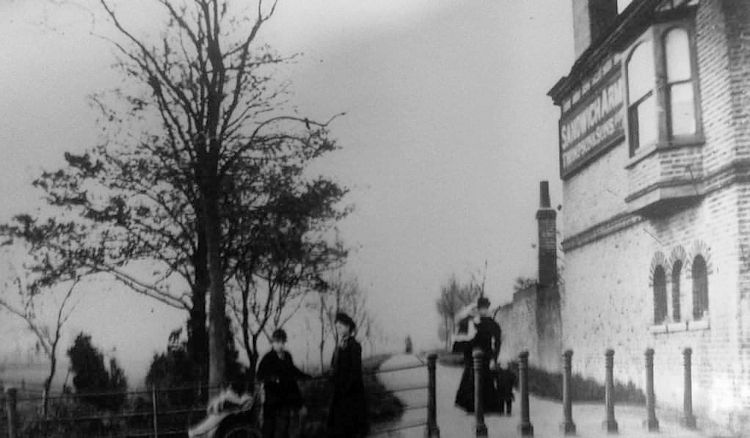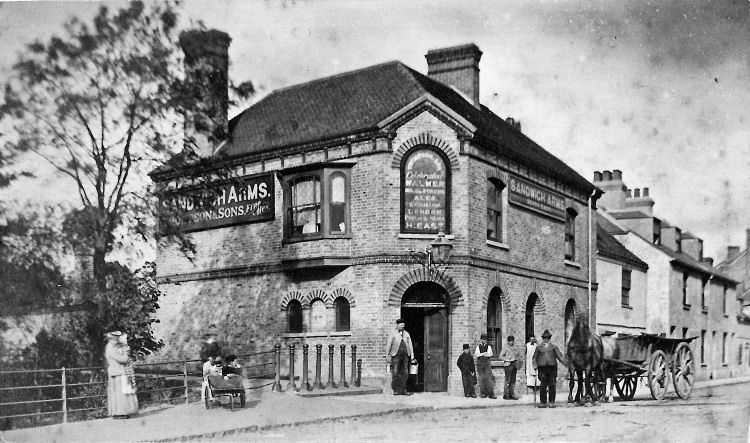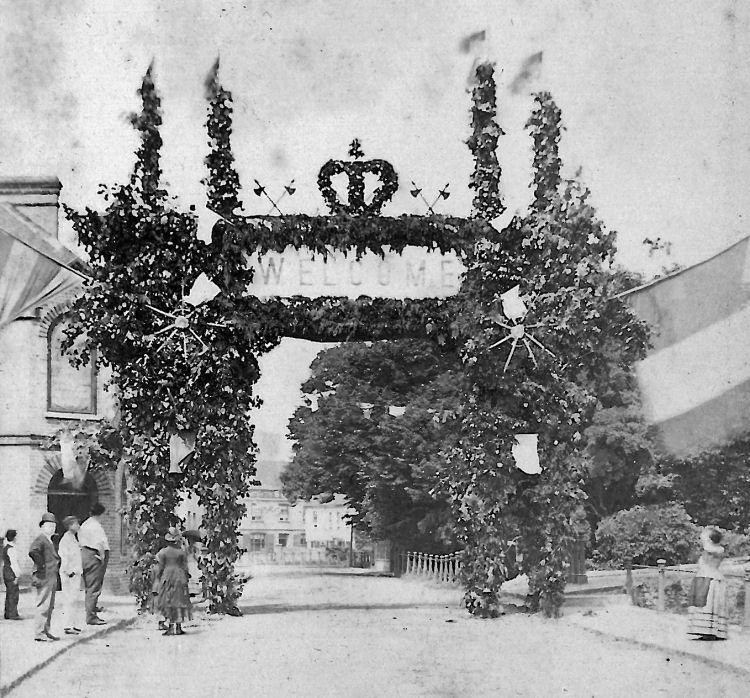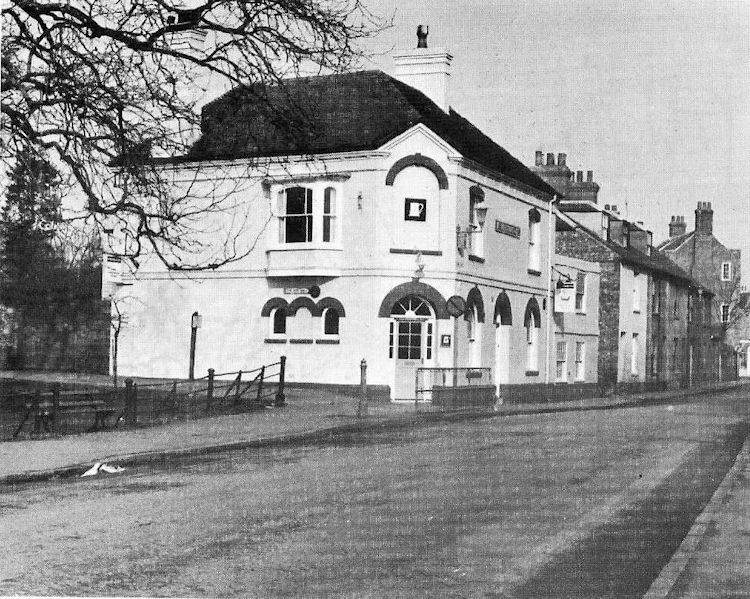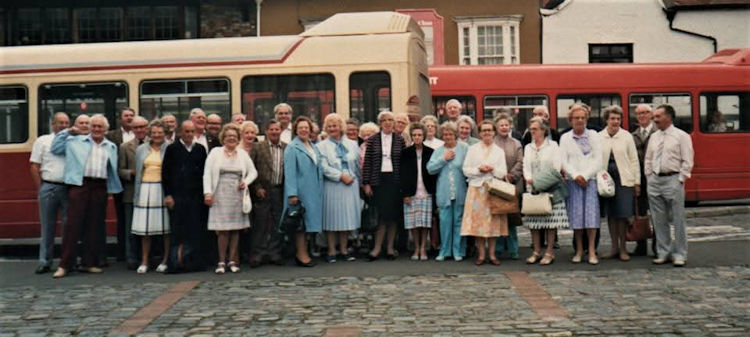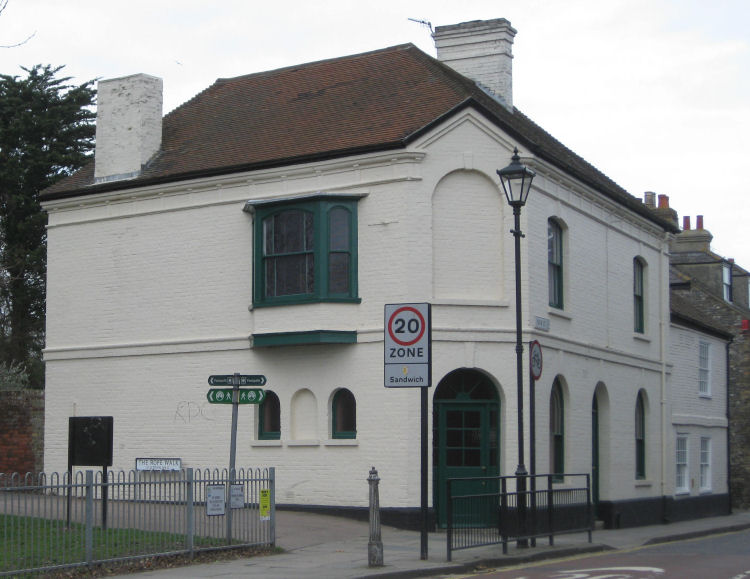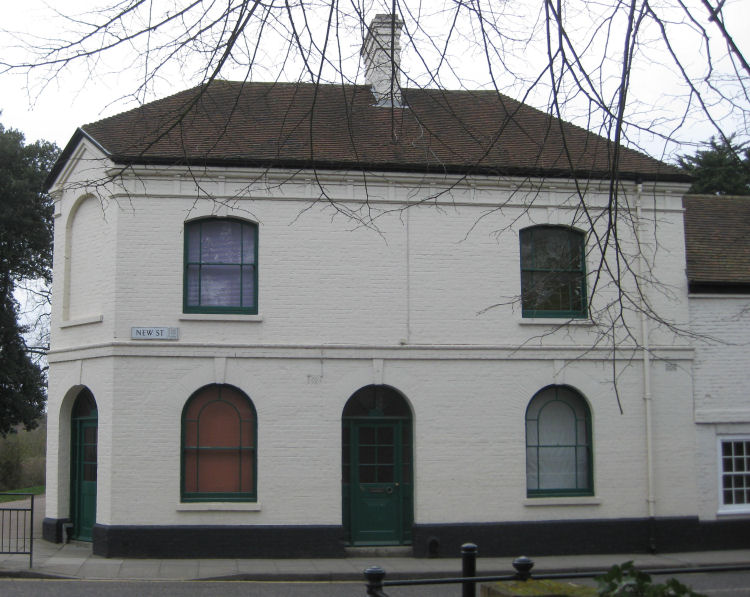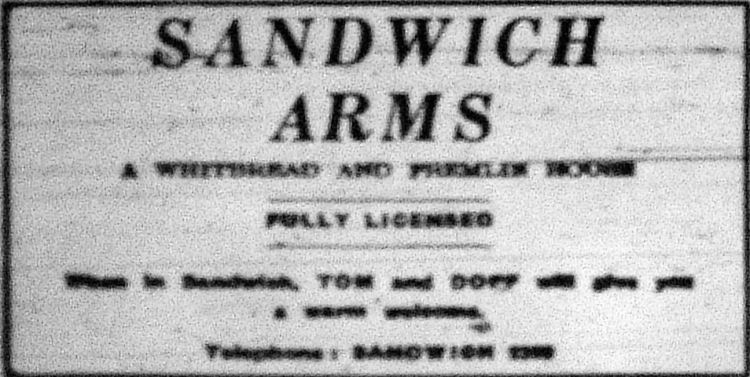|
From the Deal, Walmer, and Sandwich Mercury,
16 June, 1900. 1d.
THE CHARGE OF FRAUD AT SANDWICH
THE PRISONERS SENTENCED
At the Sandwich Petty Session on Monday, before the mayor, Alderman
Watts and Lass, and Mr. H. Maurice Page, Herbert Ernest Adams, who
described himself as a publication agent, of London, and Frederick John
Gale, described as an historical writer, both of very respectable
appearance, were charged on remand with unlawfully obtaining the sum of
£1 from Joseph Monck, of the "Sandwich Arms," on the 5th inst., under
false pretences, with intent to cheat and defraud.
Dr. Hardman said he appeared to prosecute in this case on behalf of
Mr. Monck. As some of the Magistrates were not present when the case was
formerly before the Court, he would give a few details of the facts. On
the 5th June, the two prisoners came several times to the "Sandwich
Arms," kept by Mr. Monck, and on the last occasion, about 8.30 in the
evening, the elder prisoner who gave his name as Gale, informed Mr.
Monck that he had telegraphed and telephoned to his firm, said to be the
East Kent Coal Company Limited, but he could not find them in, and he
supposed they had gone mad over the capture of Pretoria, and that was
why they were away. he said he had no doubt he would hear from them in
the morning, when he would have as much money as he required. The
younger prisoner, who now gave the name of Adams, but at that time gave
the name of Williamson, then produced a bill of exchanges, apparently
drawn on bill paper, duly stamped, and asked for a sum of money to be
given upon it, either the whole or part of the amount stated. The bill
was dated "Dover, 17th June," and was for £4 17s. 6d. sterling, wages
and expenses account, in favour of Mr. Frank J. Williamson, and was
drawn on the East Kent Coal Company, Limited, of 171, Queen Victoria
Street, London, E.C.; it had his acceptance written across it, and was
payable at the London and County Bank, Holborn, on the East Kent Coal
Company's account. Mr. Monck did not care about advancing money to
strangers, and at first refused to have anything to do with it, but
ultimately was induced to part with £1 on the security of the document,
which was left with him, and at his request the younger prisoner wrote
his name, F. J. Williamson, on the back, and that no doubt was the Frank
J. Williamson mentioned in the bill. They promised to go in the morning
and settle, but Mr. Monck did not hear anything more of them.
Consequently he gave information to the police, and they were
subsequently arrested at Deal. The elder prisoner, when arrested, said,
"You have made a mistake; I know nothing about it;" but the evidence
would satisfy the Bench that he took an active part in the negotiations,
and although the other man produced the bill, it was done by the two
jointly. There was a decided case, the Queen v. Young, which provided
that where several persons were present, and were present and were
acting together in the process of the fraudulent purpose, there was an
obtaining by all. he should call another person who was in the bar at
the time, a witness from the office of the Registrar of Joint Stock
Companies, to prove that no such Company as the East Kent Coal Company,
Limited, had been registered in England, and he should also produce
evidence that the same afternoon, but prior to this occurrence, the
prisoner took the same bill to Mr. Waters, at the "Market
Inn," and attempted to obtain money from him in the same way. There
were cases to show that attempts made previous to the offence charged
were admissible in evidence in order to prove a guilty knowledge of the
persons tendering these documents. It was necessary in cases of false
pretences that there must be statements of some pretending existing
fact, made for the purpose of inducing the prosecutor to part with his
money, and it must also be shown that the prosecutor parted with his
property by reason of the false pretences. Mr. Monck would satisfy the
Bench on this point. It would be obvious to the Magistrates that there
were in this case a number of false pretences in the existing alleged
facts. The bill purported to be valid and negotiable, there was the
pretence that the prisoner had the authority of a certain firm to draw
and negotiate it, and that the money was due to him from them, that the
Company was in existence, and had a registered office at 171, Queen
Victoria Street; there was also the pretence that the prisoner Adams was
the person Frank J. Williamson mentioned in the bill. Under a recent
statute, the Magistrates had the power to legal summarily with prisoners
in certain cases of false pretences, but he ventured to suggest, with
great respect, that this was a case in which their summary jurisdiction
could not be exercised. The amount was not a large one, but the manner
in which it was obtained showed that the prisoners were acting upon a
system. It was a form of fraud that was peculiar liable to be repeated,
and it was desirable that there should be some time between the
committal and the trial in order that proper inquiries might be made
with a view to finding out previous transactions of the prisoners in
other matters of this kind.
The Mayor said that if Dr. Hardman would confine himself to the case,
the Bench would deal with that point. They were quite aware of all the
advantages, and it was only wasting their time to go into that.
Dr. Hardman: If you please, sir.
The evidence of Mr. Monck, taken at the previous hearing was read
over, and further examined by Dr. Hardman, prosecutor said: At the time
he parted with his money he quite believed the bill tendered to him was
a valuable security for £4 17s. 6d., or he would not have parted with
his money. It was on the strength of the bill being handed over to him
that he parted with his money. He believed the verbal statement made by
the prisoner; it was a plausible story, and he thought it was correct.
By Gale: They came into the house in the morning together, and had a
few drinks. That was the first he saw of them. Towards mid-day they came
in again. They came together three times, and on the first two occasions
they did not ask for anything. On the third occasion Gale did sit down
in the public bar, and Adams went forward and leant over the bar, but
previous to that Gale made a statement. (Gale: That I will explain, I
had been to the telegraph office to send a telegram from Adams to his
firm). Gale said he had been to the telegraph office, but he did not say
for whom. But previous to that he went out, leaving a small brown paper
parcel in his (prosecutor's) charge, saying "Take care of that; that is
worth £1,000 to me." He took charge of it, and the prisoner soon
returned. Adams then came up to him, offered him a piece of paper, and
asked him if he would give him the money on this order. He said "No,"
and then Adams asked him if he would give him £3 upon it. he again said
"No," and Adams then said, "Give me something on it; we will have our
money at the Post-office in the morning." gale was standing with Adams
at the bar, and there were others present. he had never seen the paper
in gales' possession. Gale was cognizant of the whole thing. Adams
turned to gale, and said, "You have heard what he says; he cannot give
us the money."
Adams: This man has nothing to do with me.
Gale: I wish to show that I know nothing about the paper being in his
possession, not have I seen it, and I did not ask the landlord for
anything. I wish to show that I have had nothing to do with this
transaction. Prisoner is a stranger to me. I have met him on two
different occasions previously, quite by accident.
Henry Dilnott deposed that he was in the private bar of the "Sandwich
Arms" on the 5th inst., about 8.30 in the evening, and saw the two
prisoners there. They were in the public bar. He heard them getting the
change for this note, but thought that Mr. Monck knew them, till the
next morning, when he was told different. Mr. Monck gave them £1 on the
note, and Adams said, "I shall be having the money in the morning, and
will give you the full amount." He heard Adams ask Mr. Monck for money,
he believed it was 30s., on this note. Gale said he had been to the
telegraph office and the telephone, and had been to the station for the
money, and could not get any reply. (Gale: I had been to the Post-office
for him.) Witness saw the document handed to Mr. Monck; it was similar
to the one produced. Mr. Monck just looked at it before handing over the
money. Gale told Mr. Monck his friend would come and see it paid.
By Gale: He (witness) was sitting opposite the door in the
bar-parlour, and could see right into the bar. The door was open all the
time.
By Gale: Mr. Monck gave Adams, and not "them" the money. he did not
see the document in his (Gale's) hands at any time, but he heard him
tell Mr. Monck he should have the full amount in the morning.
Gale: After the money was paid, I said I believed the thing to be
right, and if Adams did not pay I would see that it was paid. I had
sufficient confidence in the man, and would have cashed it myself if i
could have spared it.
John Waters deposed that he kept the "Market
Inn" at Sandwich. The two prisoners came into his house on Tuesday,
the 5th inst., between two and three o'clock in the afternoon. They came
in as ordinary gentlemen, very good customers, and very jolly. A short
time afterwards the younger prisoner (Adams) asked him if he would cash
or advance him money on a note of hand. He handed witness a bill, or
whatever they might call it (the document produced), and asked him if he
could charge it. He told the prisoner his housekeeper would be down in a
short time, but that he did not do such business at that himself.
Prisoners left the bill in his possession, while they went to and from
the Post-office, and having no bank account, he took it to the spirit
merchants. He could not say whether they both left the house, as they
were joking and laughing, but witness took the bill away, and returned
with it; the spirit merchants' banking business was over, and they
advised him to try the bank in the morning. he told the prisoners he was
unable to do anything with it, and Adams then said it did not matter.
The elder prisoner did nothing in the matter; he was too busy
telegraphing and going to and fro. He would not be certain whether Gale
was present when Adams handed him the bill, but he was there when
witness brought it back.
Dr. Hardman: Did it seem to you that the other man was cognizant that
the money was being asked for on this bill?
Gale: Is that a privileged question - to ask a man's thoughts. Is
that evidence?
Dr. Hardman: It is a question of fact. Did what passed make it appear
to you that the elder prisoner knew money was being asked for on this
bill?
Witness: My conscience was perfectly clear that the two were one.
Dr. Hardman: Did what was said by the younger to the elder prisoner
make it clear to you that the elder one knew that money was being asked
for on this bill?
Witness: Yes, perfectly clear.
Dr. Hardman: That was the effect of the conversation?
Witness: Yes, sir.
By Adams: The prisoner gale was within three yards, and certainly
within hearing, when you asked for the money, and when I came back you
told him I could not do it. I don't say you both had your hands in one
pocket, but you were as close together as we are now, and I did not
whisper, neither did you.
By Gale: You did not individually ask me for money or anything.
Gale said he did not ask anyone for anything, and had not seen any
document. He was, he knew, slightly intoxicated, at the time, but he was
simply in the company of this man.
Arthur Elwin Taylor said he was a clerk in the office of the
Registrar of Joint Stock Companies. He had made a search in the Register
of Limited Liabilities Companies, under the Companies' Act, and there
was no such Company registered as the East Kent Coal Company, Limited,
of 171, Queen Victoria Street, London, E.C.
The evidence of Police-sergt. Curtis, taken at the last hearing, was
read over.
The Magistrates were in consultation, when the prisoner Gale said: I
should like to ask Mr. Monck a question. (Addressing prosecutor): If you
were with an acquaintance with whom you had only been in company two or
three days, and were out with him for the day, and that acquaintance
asked a person in a similar position to yourself as a publican; to cash
or advance money on an order that turned out to be wrong, would you
consider yourself to be liable for another man's act?
Mr. Monck: I have nothing to do with that. I will not answer the
question, as it has nothing to do with the matter. Your business and my
business is altogether different. What i would do and what you would do
are two different things.
prisoners elected to be dealt with summarily, and on being charged,
both pleaded not guilty.
Adams (addressing the Bench), said: I had the unfortunate coincidence
to meet a man in Maidstone about a month ago, who put me into this way
of making out these bills. You see I don't understand anything at all
about them. He said if I made out a bill at any time I was thrown upon
my resources, and got a tradesman to cash it, he would let me have a sum
of money on it, and on paying it into the Bank I could meet that bill,
and it was accommodation money. He gave me several of these bills at the
time, for which I gave him consideration in money. I had made this bill
out myself, and i had no intention whatever of defrauding Mr. Monck of
the money. My intentions were to re-fund it as soon as I had received it
from my firm. This gentleman, who was ignorant of the fact that I had
the bill, telegraphed for me, and I had full faith that I should receive
the money, and had I received it, I should have gone to Mr. Monck in the
morning, and paid him back. It did not come, and I thought that possibly
my people might not know the town I was in, and that knowing I had
business at Deal, and not thinking I was there, they had sent it on
there, and I went on to Deal to see if there was anything for me there,
but there was not. I made no false pretence whatever. I did not ask him
to lend me the whole sum, because i knew I could not afford to re-pay it
from the pay I had to come. I did use the name of a firm I did not know,
nor do I know whether there was any such firm in existence. There was no
attempt by me to cheat, defraud, or obtain money by false pretences. I
have no need of money. I have a living in my hands, and it is not
necessary for me to do anything in that way. I am a man who can get my
30s. a day when i am properly working, as I should have been if I could
have found my people at the office. When I took the money, I fully
believed that I should be in a position to re-pay it as I had stated. I
had nothing to do with this gentleman (Gale). Possibly it would have
been better for me if I had. He was not aware of what I was going to do,
and if I have to be mulcted in the matter myself, I am anxious that it
shall fall entirely on myself, and that anyone who happened to be with
me at the time will not suffer for anything I may have done. But I did
not intend to transgress myself in any shape or form, much less obtain
money by false pretences.
Gale made the following statement: I simply wish to say that during
the last three weeks there has been very little business doing with
commercial men - men who travel. There has been Mafeking day, Pretoria
Day, the Queen's Birthday, and one or two other very similar days, three
Sundays, and so forth, and if you get pleasuring one day, you are likely
to make it last a second day. I am rather a social man, and I happened
to meet this gentleman at an hotel I was staying at. We were talking to
one another, not having anything to do on these days, and found each
other very good company. I then lost sight of him, but we met again at
Ramsgate quite by accident, and we spent three-fourths of a day
together. I then came here, and we met by accident also - not by any
engagement, and we were together during this affair. I have never been
in any way inquisitive to know who are his friends or relations, nor has
he known mine. I know nothing about him, except from his own statement.
I have seen him, as I say, upon three different occasions within the
last three weeks, and because I happen to be in his society, and he does
this, I am detained with him. He certainly asked me if there was any
chance of my letting him have some money, but I said that I could not,
having been spending such a lot that I had exhausted myself. But I have
never asked anyone for money, I have never shown anyone any document,
and I have never handled one. He being in my company, to these gentlemen
in Sandwich it appears that I am with him, but according to the evidence
of Mr. Monck, who thinks he has lost the sovereign that he advanced, I
could see at once that it was a document he was handing over. But apart
from that, when we first arrived in Sandwich, Adams asked me to go to
the Post-office to telegraph for him to his firm for a sovereign. I
cannot give you the name of the telephone clerk, but he can be called,
and will verify what I say. he meant, I suppose, to pay the £1 he had
borrowed, and I felt sure he would get it. It was nothing to do with me;
I did it for Adams. That was early in the day. We liquored in two or
three houses, and the whole of the time we were in Sandwich we were
drinking, and I did say that if Mr. Monck advanced the sovereign, I felt
every confidence in this man. Having been in his company on past
occasions, I looked upon him as a man who would meet everything
honourable, and I never thought for a moment that there was anything
wrong, nor did I think he meant wrong. I made the remark that if he did
not pay I would, but it was after the act was done I said that. Mr.
Monck and the and the other gentleman have all stated on oath that they
never saw any document in my possession. I never asked for any money,
nor have I had any money pass into my hands. How can I be found guilty
because i happened to be in his company. Because one man happened to be
with another, he is not answerable for that man's actions. It has
already been a very great inconvenience and loss to me. Now that the
holidays are over, I have to recoup myself. I have had a lot of
unpleasantness, and I am as innocent as any gentlemen present. It is a
coincidence, but I have had to pay the penalty of it up to the present.
Supt. Chaney produced to the bench the following information he had
obtained from London and Margate:- The Margate police reported that
Adams stayed at 63, Dane Road for about a fortnight, with a Mr. R. Meyer
(a visitor from London), with whom he had just previously been lodging
at their London residence, 27, Borman Road, Tollington Park. It now
appeared that Mr. Meyer had been defrauded by him. On leaving Dane Road,
Adams went to the "Imperial Hotel," for a day or two, leaving without
paying on June 2nd, and he had not been seen at Margate since. Whilst at
the "Imperial," he obtained £3 from the manageress on the security of a
draft for £6 18s. which he represented was due to him as wages from A.
W. Innes and Co., 161, Upper Kensington Lane, S.E. This draft was
probably worthless, but as the manageress declined to prosecute, no
enquiries were made. Gale was seen about Margate with Adams, but nothing
was known of him.
The Metropolitan Police reported that the prisoner Adams resides at
24, Foxley Road, Brixton, in April last. he remained there about six
weeks, with a young lady who he represented as his sweetheart, occupying
separate rooms, and the landlady had difficulty in getting the rent,
which she did finally by threatening to call the police. he then went to
Tollingate Park, where he remained till April 27th, leaving to go to
Margate, being a month in arrears with his rent. During the time he was
residing in Brixton, he was employed by Messrs. A. W. Innes and Co.,
161, Upper Kensington Lane, S.E., as a traveller in laundry requisites,
to be paid on commission. At this place he obtained from his employer,
be means of bogus orders, about £20, but at present Mr. Innes had not
decided to prosecute. the firms given at 78 and 171, Queen Victoria
Street, were fictitious. prisoner had obtained a suit from a tailor in
Tolingate Park, and a gold watch from a jeweller in Walworth, which were
unpaid for. Enquiries at Scotland Yard elicited the fact that a man
named H. E. Adams, and somewhat answering to the description of one of
the prisoners, was in custody of the Governor of Kilmainham Prison in
July, 1899, on a charge of obtaining money by worthless cheques.
The mayor said there was no doubt in the minds of the Bench that the
prisoners were both guilty of this offence. They were together in both
public houses and in the first instance they attempted to carry out what
they were successful in accomplishing in the second. The sentence of the
Court was that they be imprisoned for two months with hard labour.
|
